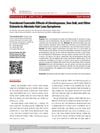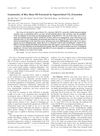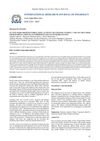 February 2024 in “International Journal of Progressive Research in Engineering Management and Science”
February 2024 in “International Journal of Progressive Research in Engineering Management and Science” The herbal shampoo is safe, effective, and helps treat hair loss.
64 citations,
October 1998 in “Acta dermato-venereologica” Grape seed proanthocyanidins can promote hair growth.
 15 citations,
January 2016 in “Sustainable development and biodiversity”
15 citations,
January 2016 in “Sustainable development and biodiversity” Using PGPR as biofertilizers can improve soil health and plant growth while reducing reliance on synthetic fertilizers.
 67 citations,
June 2018 in “Engineering in Life Sciences”
67 citations,
June 2018 in “Engineering in Life Sciences” Plant cell culture is a promising method for creating sustainable and high-quality cosmetic ingredients.
 April 2021 in “Han'gug miyong haghoeji/Journal of the Korean society of cosmetology”
April 2021 in “Han'gug miyong haghoeji/Journal of the Korean society of cosmetology” Eating raw cheonggukjang improves scalp hair in middle-aged women.
 18 citations,
February 2014 in “PubMed”
18 citations,
February 2014 in “PubMed” Androgenetic alopecia is a common hair loss condition caused by testosterone effects on hair follicles, leading to thinner, shorter, and less pigmented hair, diagnosed using scalp dermoscopy and treated with topical minoxidil, antiandrogen agents, and 5-alpha reductase inhibitors.
 39 citations,
June 2017 in “Journal of Applied Research on Medicinal and Aromatic Plants”
39 citations,
June 2017 in “Journal of Applied Research on Medicinal and Aromatic Plants” Plant-based ingredients are effective and safe for modern skincare products.
 7 citations,
January 2017 in “Clinical and medical investigations”
7 citations,
January 2017 in “Clinical and medical investigations” Suriname uses many plants for beauty, with potential for a beauty industry, but more evidence is needed for product effectiveness.
 9 citations,
April 2023 in “Journal for Research in Applied Sciences and Biotechnology”
9 citations,
April 2023 in “Journal for Research in Applied Sciences and Biotechnology” Zinc is important for growth and health in animals, plants, and humans, and not having enough can cause various problems.
 December 2024 in “International Journal of Molecular Sciences”
December 2024 in “International Journal of Molecular Sciences” Linoleic acid is important for healthy skin and hair.
38 citations,
January 2020 in “Journal of Experimental Botany” Moderate water stress helps rice form rhizosheaths by affecting hormone responses, which may aid in breeding drought-resistant rice.
 May 2023 in “Antioxidants”
May 2023 in “Antioxidants” Peptides from oysters may safely and effectively heal skin wounds with less scarring.
 24 citations,
March 2022 in “Frontiers in plant science”
24 citations,
March 2022 in “Frontiers in plant science” Plant root hair growth is mainly controlled by hormones like auxin and ethylene, which promote growth, while others like brassinosteroid inhibit it.
5 citations,
October 2022 in “Biology” CAP1 helps Arabidopsis plants grow better under ammonium stress.
 4 citations,
October 2022 in “Frontiers in public health”
4 citations,
October 2022 in “Frontiers in public health” Cadmium chloride pollution can cause skin disorders, speed up aging, and prevent hair growth.
 28 citations,
December 2018 in “Plant, cell & environment/Plant, cell and environment”
28 citations,
December 2018 in “Plant, cell & environment/Plant, cell and environment” A protein called PLC2 is important for the growth and development of plant roots influenced by auxin.
December 2023 in “Melatonin research” Nanocarriers make melatonin more effective and reduce side effects.
 8 citations,
April 2020 in “Journal of Ethnopharmacology”
8 citations,
April 2020 in “Journal of Ethnopharmacology” Herbs might help with hair loss, but more research is needed to confirm their safety and effectiveness.
 14 citations,
April 2021 in “Biology”
14 citations,
April 2021 in “Biology” Thai rice bran extracts, especially from Tubtim Chumphae rice, can significantly reduce the activity of hair loss genes, with x-tocopherol showing potential as an anti-hair loss product.
 January 2023 in “International Journal of Molecular Sciences”
January 2023 in “International Journal of Molecular Sciences” Maxillariinae orchids contain 62 compounds with potential health benefits, including treating skin conditions and diseases like cancer and diabetes.
 4 citations,
March 2021 in “Asian Journal of Beauty and Cosmetology”
4 citations,
March 2021 in “Asian Journal of Beauty and Cosmetology” Dendropanax, sea salt, and other extracts can help reduce hair loss and promote hair growth.
 10 citations,
April 2019 in “Environmental Science and Pollution Research”
10 citations,
April 2019 in “Environmental Science and Pollution Research” Eating selenium-rich rice improved antioxidant activity and signs of aging in mice.
 2 citations,
September 2023 in “Frontiers in sustainable food systems”
2 citations,
September 2023 in “Frontiers in sustainable food systems” Traditional knowledge of edible oil-producing plants in Sinja Valley is declining due to outmigration and sociocultural changes.
 7 citations,
January 2014 in “Biological & pharmaceutical bulletin”
7 citations,
January 2014 in “Biological & pharmaceutical bulletin” Rice bran oil extracted by supercritical CO2 is considered non-genotoxic.
2 citations,
July 2021 in “Genes” A specific genetic change in the KRT71 gene causes a hair loss condition in Hereford cattle.
 7 citations,
January 2015 in “Biological & Pharmaceutical Bulletin”
7 citations,
January 2015 in “Biological & Pharmaceutical Bulletin” Rice Bran Supercritical CO2 Extract significantly increased hair density and diameter in male alopecia patients without any side effects.
 January 2025 in “Current Issues in Molecular Biology”
January 2025 in “Current Issues in Molecular Biology” Certain plant extracts may help prevent hair loss and promote hair growth safely.
 1 citations,
October 2018 in “International research journal of pharmacy”
1 citations,
October 2018 in “International research journal of pharmacy” Rampai leaves extract can significantly stimulate hair growth.
 1 citations,
December 2022 in “Journal of applied biological chemistry”
1 citations,
December 2022 in “Journal of applied biological chemistry” TRP-hair essence protects hair from heat damage, maintains color, and strengthens hair.
 November 2024 in “International Journal of Molecular Sciences”
November 2024 in “International Journal of Molecular Sciences” Nanoparticles may improve caffeine delivery for hair growth, offering a potential alternative to minoxidil for hair loss treatment.

























